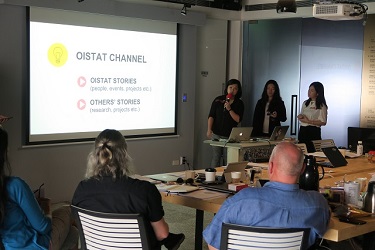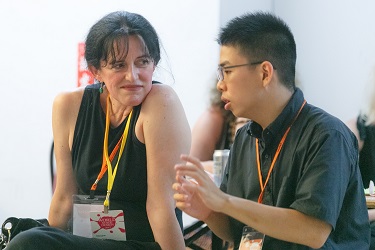Written by Annis Chan, OISTAT 2017 Intern

Cheers to our 2015 interns Yen-Hsiu and Yu-Hua! Left: Yen-Hsiu; Right: Yu-Hua (Photo: Jenny Lee)
Commenced in 2013, OISTAT internship programme at Headquarters in Taipei has come to its fifth year. Yu-Hua Chang and Yen-Hsiu Chen were the interns of 2015. Two years have passed, they are now a master graduate and a freshman in career. Here they talk about their experience at OISTAT and young vision of arts administration industry.
Your opinion matters - subverting office routine at OISTAT Headquarters
The memory is still fresh like yesterday, they are delighted to recall how did they learn about OISTAT internship programme at the very beginning. Yu-Hua, who was still doing her master degree at National Taiwan Normal University, spurred her interest in OISTAT and its connection of global performing arts after joining the organization as a member of the Core Strategy Project 2015-2016.
They had never worked with foreign or international organizations until they met OISTAT. “The Touring Forum Understanding International Organizations in Taiwan by Wan-Jung Wei (the Executive Director of OISTAT) was when I first heard about OISTAT,” says Yen-Hsiu, who graduated as a Cultural and Creative Industries Management major in 2016, and is currently an arts administrator of a contemporary gallery.

Understanding International Organizations Touring Forum. (Photo: OISTAT)
They giggle when they narrate the first day to work. “We thought there would be a mentor guiding us!” The Headquarters is an interesting office with a lot of business, but easily managed in their calm manner and great sense of humour. Amid of hectic agenda at the Headquarters, the interns soon adapted to an independent working environment and were in favour of it.
“What’s good about it is that you enjoy a really high degree of freedom,” says Yu-Hua. By minimizing a hierarchy of communication, you are always welcome to express yourself freely at the Headquarters. “My voice is valued. You see your idea is facilitating the discussion, making contribution, and…it’s awesome!”
Yen-Hsiu: The internship’s influence felt even today
It is not only about the flexibility; Yen-Hsiu concedes that the learning and working pattern at the Headquarters came a lot faster and vaster. “Ample space for initiating questions is significantly helpful.” She continues, “I channel a similar approach to my intern co-workers at the gallery.”
“There were a lot of new knowledge and vision to internalize even by close observation,” says Yen-Hsiu, who is still impressed by the abundant but meticulous planning and communication months before the project took place.
“There’s still a lot of work to follow up and prepare at night, despite the crowded schedule that day.” Although she did not get to an exhaustive participation of the advanced duty, she comes to believe that the seemingly trivial but indispensable details are where OISTAT manifests its credibility and sophistication.

2015 intern Yen-Hsiu worked at the reception desk. (Photo: PiCheng Wang)
Yu-Hua: The professional meet-up sparks new ideas beyond imagination
The Involving Audiences International Summit, which invited experienced and prolific local theatre practitioners, provided Yu-Hua the scope to comprehend the breadth of the field.
“I was like, wow! I didn’t know there were this many of people in Taiwan who have been committing themselves to performing arts,” she is amazed. “It is not about whether the upshot is good or bad, but the consciousness to get together, and come up with any new ideas that make the field a better place.”

2015 Involving Audiences International Summit and Academy (Photo: OISTAT)
The international position of OISTAT is like a thumbnail of opportunities beyond Taiwan. By encountering various theatre designers and organizations around the world, Yu-Hua has been inspired to take plenty of global references in dealing with performing arts or creative industries. “Perhaps we do not transfer and apply the entire mechanism or approach, still they are good examples to ponder over some glocal possibilities for Taiwan.”
Do arts and administration contradict themselves?
When asked if they find arts administrator a conflicting role, as revealed by the work title, their responses vary. Yen-Hsiu reckons the relationship between arts and administration is interdependent. “With the support of arts administrators, artists can really concentrate on creating works.”
She also suggests to see a production or an art piece as an integral work, “I don’t think it is conflicting. If one loves performing arts, one would find a role in it and serve his or her best to it, and therefore here we are, who choose to take up the administration part.”
While Yu-Hua thinks, it is always a critical and embarrassing position, especially when there’s financial pressure, which usually burdens effective communication. However, she would like to resolve it in this way – “An arts administrator, after all, whose responsibility is to balance and navigate the networks within the team or organization. The members hold on to the same belief, which is to deliver the idea as a whole to the audience. In that sense, regardless of who you are, artist or administrator, we all share the same goal and vision.”
Administering the arts, administering the diversity
“Indeed, it is a different issue when it comes to work.” Yen-Hsiu says matter-of-factly. Despite the complex job nature, they explain the reasons that make them stay. “I am grateful that everything (learning and job hunting) is generally smooth, and I would like to know more about people from different cultural-related fields in Taiwan,” says Yen-Hsiu.
Although Yu-Hua does not limit herself only in the arts and cultural area, she enjoys the nature of being an arts administrator, who frequently interacts with people of diverse backgrounds. “We communicate with people who do not share the same characters or styles, but in the course of reaching a compromise may lead you to a whole new perspective of looking into the world. And this new vision or value could be very rewarding.”
The growing importance of young people in OISTAT
After two years, the interns see OISTAT growing younger. “It is like revitalizing. OISTAT progresses with history and its experience but it grows younger and younger against time,” says Yen-Hsiu.
They mention the Headquarters has launched different programmes for young people to engage in OISTAT events. “Many experienced theatre professionals from all around the world are concern about the young generation. They are happy to talk and share their experience with you,” says Yu-Hua who remembers the invariable positive energy within the OISTAT family. “A lot of dynamic insights going on in OISTAT, which I think we should keep it up,” Yen-Hsiu adds. “The programmes are opportunities for interested individuals to aggregate relevant experience and important for OISTAT to retain talents for sustainable development.”


Members of the Core Strategy team were proposing the development of OISTAT channel to OISTAT members. (Left) (Photo: OISTAT)
An OISTAT Seed Volunteer was discussing the performances and design works with an OISTAT member at World Stage Design 2017 in Taipei. (Right) (Photo: PiCheng Wang)
Our definition of OISTAT
In retrospect, we invite them to give their meaning of OISTAT. Then comes a long and quiet contemplation.
“OISTAT is a brand,” says Yen-Hsiu. “You feel secure and anchored with OISTAT. It is an organization supporting everyone, and an organization with stories. I can tell what OISTAT is doing.”
“It is a brand that clustered with energy – different kinds of people, organizations, events happen and gather together because of this place,” Yu-Hua explains. “Theatre-makers from different countries, regardless of their own duties or work, come together to discuss and exchange ideas, inspiration or discovery. The regular meetings are how the power accumulated.”
As closing remarks, the two interns leave a warm message to future OISTAT new blood – “OISTAT is where you make new networks and advance the established. Grasp each opportunity and don’t be afraid of trying.”

The Interview was written by Annis Chan,
the 2017 Intern of OISTAT
(Photo: PiCheng Wang)